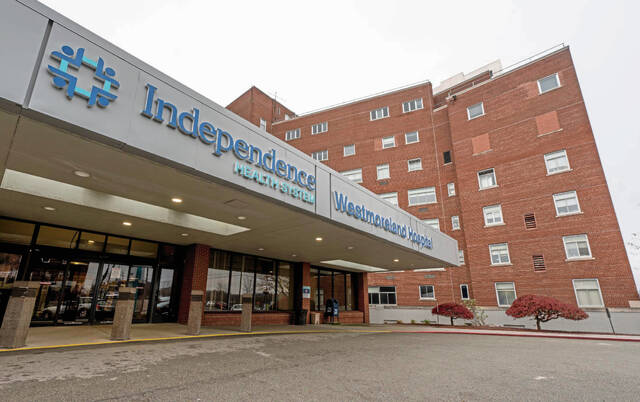https://triblive.com/local/westmoreland/inadequate-payment-for-services-nudges-small-health-systems-like-independence-toward-merger-officials-say/
Inadequate payment for services nudges small health systems like Independence toward merger, officials say

The merger of smaller regional hospital systems such as Independence Health with a larger health system — this one from West Virginia — is likely being driven, in part, by hospitals hurting from insufficient reimbursement for the cost of treating patients, a Pittsburgh-based health care consultant said.
West Virginia University Health System and Independence — with its five hospitals in Butler, Clarion, Greensburg, Latrobe and Mt. Pleasant — announced a merger Wednesday.
The new system is expected to give Independence the benefits of being part of a larger health system.
“They’re not able to get adequate payment (for services) because they don’t have as much negotiating leverage” with the health insurance plans, said Harold Miller. Miller is president of The Center for Healthcare Quality and Payment Reform, a national policy center that facilitates improvements in health care payment and delivery systems.
The merger still must win approval from state and federal regulators, as well as consent from the holders of the health system debt. Officials of the health systems said they expect negotiations to finalize the merger will be complete by June 1, with the deal closed by the end of September.
The decision to merge with the WVU Health System was not made out of desperation, said Ken DeFurio, president and CEO of Independence Health, which was formed in 2023 with the merger of the Excela Health and Butler Health systems.
Independence, however, had reported that it posted losses of about $74 million in 2023. The health system, however, had cut its losses to about $41 million in fiscal year 2024.
“It’s unfortunate that they (Independence) had to be acquired by a larger health system to get adequate payments,” Miller said. “A lot of the smaller hospitals are closing because they aren’t getting adequate payment.”
A health system as large as the WVU Health System, on the other hand, is able to get adequate reimbursement contracts from insurers because it has the patient base, Miller said.
The Hospital Association of Pennsylvania would not comment on the merger. But a spokesperson said less than half of the state’s acute care hospitals are operating with margins needed for long-term stability, according to data from the Pennsylvania Health Care Cost Containment Council.
More than one-third of the hospitals have experienced multiyear losses, HAP said in a statement.
“A key driver of this stress is that payments do not cover the cost of providing care,” the hospital association said.
Pennsylvania’s Medicaid program — which covers close to one in four Pennsylvanians — has chronically underpaid hospitals, reimbursing only 71 cents per dollar, on average, for the care of Medicaid patients and uninsured patients, the association said.
That problem exists in an environment in Western Pennsylvania in which the two largest insurers — UPMC Health Plan and Highmark — also own Western Pennsylvania’s largest health systems — UPMC and Allegheny Health Network.
WVU Health System, like its large counterparts based in Pittsburgh, has its own health insurance — Peak Health.
WVU Health states on its website it accepts the UPMC Health Plan at its Uniontown Hospital and Highmark Pennsylvania Blue Cross is accepted at all of its Pennsylvania locations.
WVU Health does not anticipate any changes “at this time” for patients who are covered for care at Independence Health facilities through their UPMC Health Plan, said Angela Jones, a WVU Health spokeswoman.
Pennsylvania Health Secretary Valerie Arkoosh, speaking at the Pennsylvania Mountains Rural Health Conference at Indiana University of Pennsylvania, said Thursday the kind of merger that Independence is seeking with WVU Health is nothing new.
Pennsylvania Mountains Care Network is an alliance of 13 hospitals and medical centers.
“We’ve been seeing that activity for quite a while,” Arkoosh said. “No independent hospital is taking it to the bank.”
Speaking to the impact on Independence Health employees, Jones stated that “we consolidate certain back-office functions when it makes sense and historically have limited those to just a few — legal, human resources, corporate compliance, information technology and select elements of finance.
“Even then, many of the people who support those functions remain hospital-based and work onsite. Most other back-office functions continue to reside entirely at the hospital level,” Jones said. That approach, Jones added helps WVU Health strike the right balance by keeping resources closest to patients and their bedside.
The largest driver of its corporate overhead is the investment required to maintain the IT infrastructure that supports the network of hospitals, clinics, and outpatient facilities, Jones said.
Among the unanswered questions raised by WVU Health System’s acquisition of Independence is the fate of the UPMC Hillman Cancer Center at the Arnold Palmer Pavilion in the Mountain View neighborhood of Unity.
“All of Independence Health System’s programs, services and entities will remain intact under the umbrella of WVU Medicine,” said Kelley Skoloda, a spokeswoman for Independence Health.
“UPMC will continue to provide care and services to patients and communities in all our regions,” said Susan Manko, a spokeswoman for UPMC.
As part of the merger deal, WVU Health has promised to invest $800 million into Independence Health, including $500 million at Westmoreland Hospital in Greensburg.
Jones said that among WVU Health’s immediate priorities will be expanding and building out the Butler Memorial Hospital emergency department and growing its clinical services.
It also plans to make key upgrades to Westmoreland Hospital and expand its specialty and subspecialty services, Jones stated.
Copyright ©2026— Trib Total Media, LLC (TribLIVE.com)
